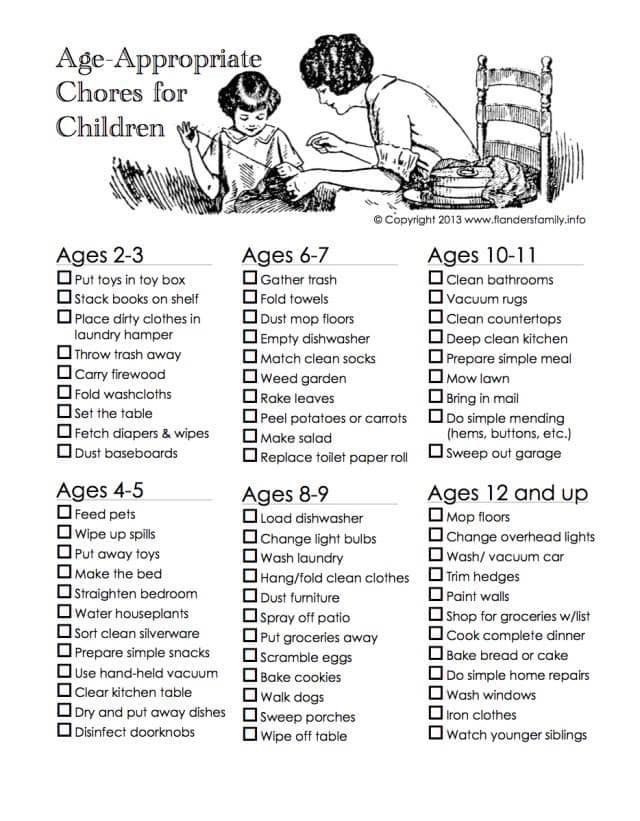
Why Are Chores Important for Kids?
As parents, we often find ourselves juggling numerous responsibilities, from managing household tasks to ensuring our children are happy and healthy. Integrating children into daily chores not only lightens our load but also plays a crucial role in their development. Chores teach kids responsibility, time management, and essential life skills that they’ll carry into adulthood.
When kids participate in chores, they gain a sense of accomplishment and learn the value of contributing to the family unit. It’s not just about keeping the house clean—it’s about instilling habits that promote independence and self-discipline. Moreover, working together on household tasks can strengthen family bonds, creating a sense of teamwork and shared purpose.
Introducing age-appropriate chores is the key to keeping things manageable and enjoyable for both parents and children. From simple tasks like putting away toys to more complex responsibilities like preparing meals, each age group can handle different levels of chores. Understanding what chores are suitable for each age group ensures that children are neither overwhelmed nor bored. Let’s dive into the specifics, starting with our youngest helpers—toddlers.
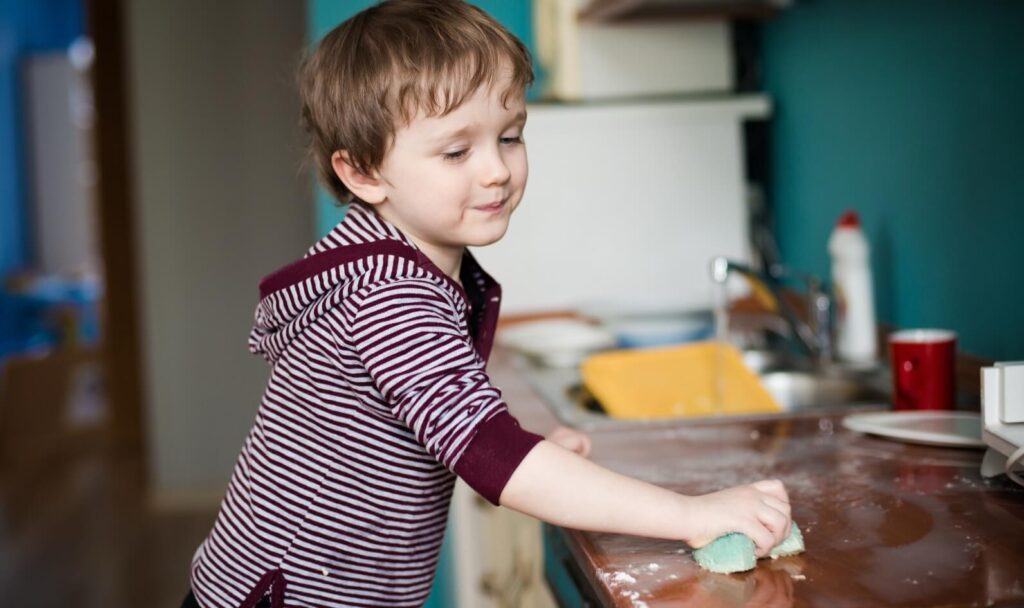
What Chores Are Appropriate for Toddlers (Ages 2-3)?
Introducing chores to toddlers might seem daunting, but children as young as two or three are eager to help and mimic their parents. The key is to keep tasks simple, safe, and fun. At this age, children are developing their motor skills and learning to follow instructions, making it an ideal time to start with basic chores.
Simple Chores for Toddlers
- Put Toys in the Toy Box: Encouraging toddlers to tidy up their play area teaches them organization and responsibility.
- Stack Books on the Shelf: This task helps with motor skills and instills a sense of order.
- Place Dirty Clothes in the Laundry Hamper: This simple chore is a great way to introduce the concept of cleanliness.
- Throw Trash Away: Toddlers love to feel helpful, and this easy task can be quite satisfying for them.
- Carry Firewood: If it’s safe, carrying small pieces of firewood can be a fun outdoor chore.
- Fold Washcloths: Folding small items helps develop fine motor skills and patience.
- Set the Table: Involving your toddler in meal preparation by having them set the table with non-breakable items fosters a sense of contribution.
- Fetch Diapers and Wipes: Toddlers can help out by fetching diapers and wipes for their siblings.
- Dust Baseboards: Using a dust cloth or duster, toddlers can help keep the house clean.
These simple chores are not only manageable but also enjoyable for toddlers. They provide an excellent opportunity to teach young children about responsibility and the importance of contributing to the household. For more engaging activities that can keep your toddlers entertained, check out our article on Fun and Engaging Indoor Toddler Activities for Hours of Playtime.

How Can Preschoolers (Ages 4-5) Help Around the House?
As children grow older, their ability to handle more complex tasks improves. Preschoolers, typically aged four to five, are more capable and can start taking on chores that require a bit more coordination and responsibility. These tasks help them develop independence and a sense of accomplishment.
Age-Appropriate Chores for Preschoolers
- Feed Pets: Supervised feeding of pets teaches responsibility and empathy towards animals.
- Wipe Up Spills: Giving preschoolers a cloth to wipe up their spills encourages cleanliness and quick response.
- Put Away Toys: While similar to toddlers, preschoolers can handle more specific instructions, like sorting toys by type.
- Make the Bed: Simple bed-making, even if it’s just pulling up covers, promotes a habit of tidiness.
- Straighten Bedroom: Picking up items and organizing their space helps them appreciate a clean environment.
- Water Houseplants: This chore connects children to nature and teaches care for living things.
- Sort Clean Silverware: Sorting tasks improve cognitive skills and help preschoolers learn to categorize items.
- Prepare Simple Snacks: Under supervision, preschoolers can help with easy tasks like spreading peanut butter on bread.
- Use Hand-Held Vacuum: Lightweight vacuums can be fun for kids to use, turning cleaning into a game.
- Clear Kitchen Table: Clearing plates and utensils after meals reinforces teamwork and responsibility.
- Dry and Put Away Dishes: Drying non-breakable dishes and putting them away introduces them to kitchen organization.
- Disinfect Doorknobs: Wiping doorknobs with disinfectant wipes is a simple yet important task, especially during flu season.
By engaging preschoolers in these chores, you not only help them develop essential skills but also build their confidence and sense of belonging within the family. Additionally, incorporating fun and educational activities into their routine can make these chores feel less like work and more like play. For example, sharing stories like Meet Daisy the Duckling: Kids Story can be a great way to bond and teach valuable lessons in an enjoyable way.
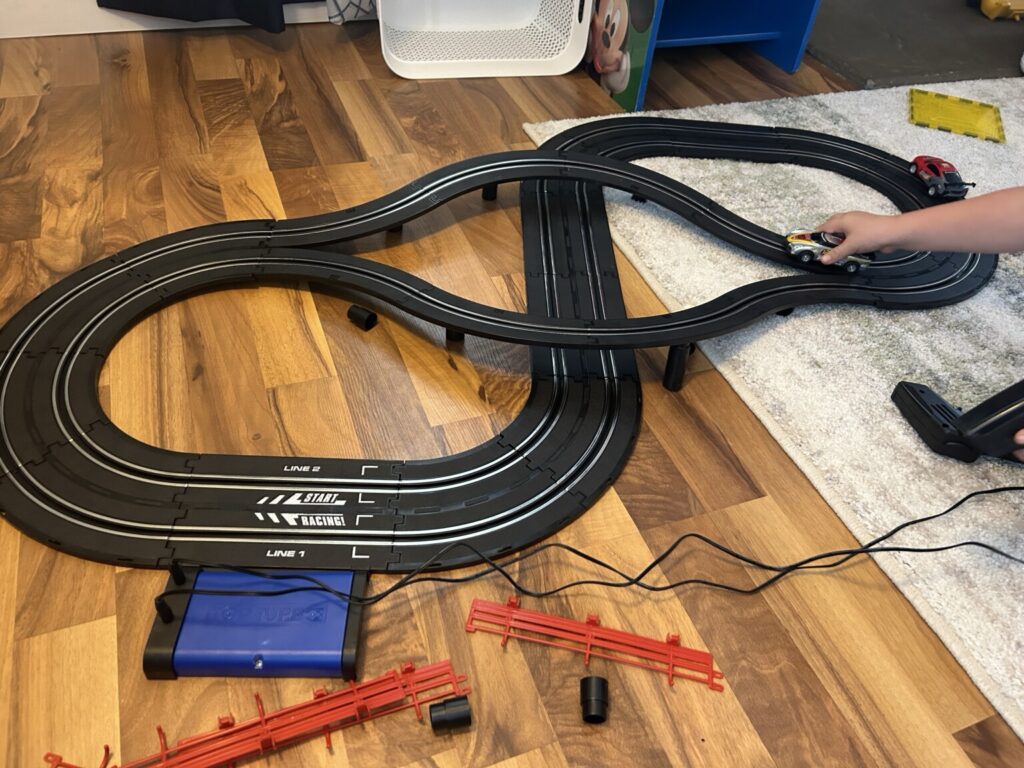
Chores for Early School-Age Kids (Ages 6-7): Building Responsibility
By the time children reach the ages of six and seven, they have developed better motor skills and cognitive abilities, making them ready for more complex chores. These tasks not only build responsibility but also help in honing their problem-solving skills and work ethic. Encouraging kids to take on these chores can make them feel more involved in family life and teach them the value of contributing to household upkeep.
Cleaning Tasks for 6-7 Year-Olds
- Gather Trash: Collecting trash from various rooms and putting it into the main trash bin teaches children about waste management.
- Fold Towels: Folding larger items like towels helps improve organizational skills and hand-eye coordination.
- Dust Mop Floors: Using a dust mop on floors is a manageable task that keeps the house clean and allows kids to see the immediate results of their efforts.
- Empty Dishwasher: Unloading dishes and putting them away teaches responsibility and kitchen safety.
- Match Clean Socks: Matching socks is a fun way to develop sorting and matching skills.
- Weed Garden: Gardening tasks like weeding connect children to nature and teach them about plant care.
- Rake Leaves: Raking leaves is a physical activity that also helps keep the yard tidy.
- Peel Potatoes or Carrots: With proper supervision, using a vegetable peeler can introduce kids to cooking tasks.
- Make Salad: Preparing a simple salad is a great way for kids to participate in meal prep and learn about healthy eating.
- Replace Toilet Paper Roll: This simple task teaches kids to be considerate and aware of household needs.
Incorporating these chores into your child’s routine can be both educational and rewarding. They learn to take responsibility for their tasks and see how their contributions make a difference in the household. For more ideas on keeping kids engaged and active, consider checking out our article on Kids vs Parents: Family Game for Kids and Adults. This can provide additional inspiration for turning everyday tasks into fun, family-oriented activities.

What Are the Best Chores for Kids Ages 8-9?
Children aged eight to nine are ready for more advanced chores that require greater independence and responsibility. At this stage, they can handle tasks that involve a bit more complexity and can be trusted to complete them with minimal supervision. These chores help them develop a stronger sense of responsibility and contribute significantly to household maintenance.
Increasing Complexity of Household Responsibilities
- Load Dishwasher: Learning to load a dishwasher properly teaches kids about organization and efficiency in kitchen chores.
- Change Light Bulbs: Simple home maintenance tasks like changing light bulbs promote independence and safety awareness.
- Wash Laundry: Operating the washing machine and learning about different laundry cycles helps kids understand garment care.
- Hang/Fold Clean Clothes: Handling clean laundry teaches organization and tidiness.
- Dust Furniture: Dusting various surfaces keeps the home clean and teaches attention to detail.
- Spray Off Patio: Using a hose or pressure sprayer to clean the patio is both fun and practical.
- Put Groceries Away: Unpacking and organizing groceries helps kids understand food storage and kitchen organization.
- Scramble Eggs: Basic cooking tasks like scrambling eggs are great for building culinary skills and confidence in the kitchen.
- Bake Cookies: Baking is a fun activity that teaches measurements, following recipes, and patience.
- Walk Dogs: Taking responsibility for walking the family pet teaches empathy and the importance of regular exercise.
- Sweep Porches: Sweeping outdoor areas helps keep the house clean and teaches kids about maintaining external spaces.
- Wipe Off Table: Cleaning the table after meals reinforces cleanliness and responsibility.
Introducing these more complex chores to your eight and nine-year-olds can significantly contribute to their development and the smooth running of the household. By involving them in meaningful tasks, you help them build life skills that will serve them well in the future. For additional engaging activities that can complement these chores, check out our article on Bumper Cars for Kids: A Fun and Exciting Ride-On Experience. It offers fun and exciting ways to reward kids for their hard work.

Chores for Tweens (Ages 10-11): Preparing for Independence
As children enter their tween years, they are capable of handling more significant responsibilities that prepare them for greater independence. Chores for this age group should challenge them just enough to build confidence and competence in various household tasks. These activities not only help maintain the household but also teach essential life skills that are crucial for their development.
Advanced Chores for 10-11 Year-Olds
- Clean Bathrooms: Thoroughly cleaning sinks, toilets, and tubs teaches attention to detail and hygiene.
- Vacuum Rugs: Vacuuming helps maintain clean floors and teaches kids to use household appliances properly.
- Clean Countertops: Wiping down kitchen and bathroom countertops helps keep surfaces clean and germ-free.
- Deep Clean Kitchen: Tasks like cleaning out the fridge, wiping down cabinets, and scrubbing the stove teach deep cleaning skills.
- Prepare Simple Meals: Cooking basic meals, such as pasta or grilled cheese, builds culinary skills and independence.
- Mow Lawn: With proper supervision, mowing the lawn teaches responsibility and care for the yard.
- Bring in Mail: Collecting and sorting mail helps kids understand organization and responsibility.
- Do Simple Mending (Hems, Buttons, etc.): Basic sewing tasks teach valuable skills and self-reliance.
- Sweep Out Garage: Keeping the garage clean promotes a sense of order and responsibility for all areas of the home.
Involving tweens in these chores not only helps with the household workload but also prepares them for the independence of their teenage years. They gain practical experience and confidence, knowing they can handle more complex tasks. For more insights into age-appropriate activities and their benefits, consider reading our article on Is it Safe for Children to Eat Spicy Food?, which explores the impact of various experiences on children’s development.
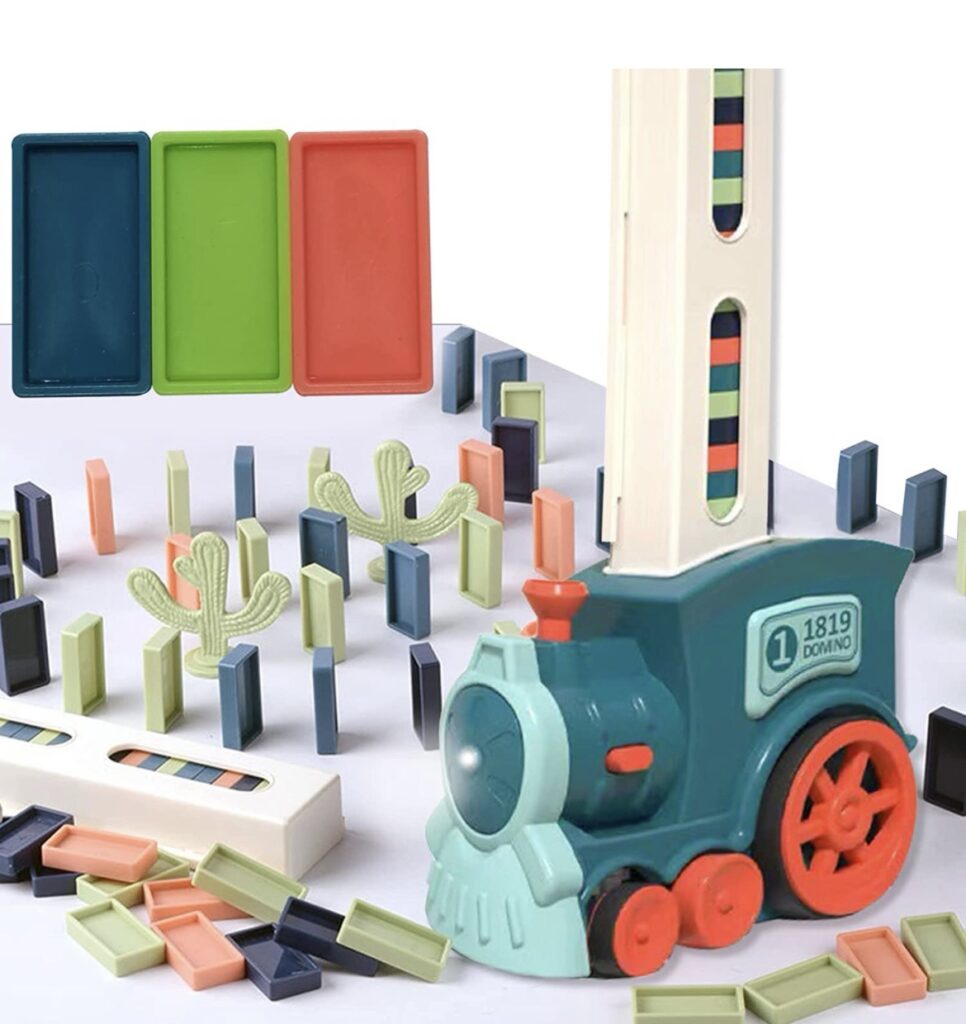
Household Responsibilities for Teens (Ages 12 and Up): Preparing for Adulthood
By the time children reach their teenage years, they are ready to take on more adult-like responsibilities that require higher levels of skill and independence. These chores not only help maintain the household but also prepare teens for life beyond the family home. Encouraging teens to participate in these tasks helps build their confidence and readiness for adulthood.
Age-Appropriate Chores for Teenagers
- Mop Floors: Regularly mopping floors teaches teens the importance of maintaining a clean living environment.
- Change Overhead Lights: Safely changing light bulbs in ceiling fixtures builds practical home maintenance skills.
- Wash/Vacuum Car: Taking care of the family car instills a sense of pride and responsibility for shared assets.
- Trim Hedges: Yard work such as trimming hedges teaches landscaping skills and attention to detail.
- Paint Walls: Painting projects help teens learn about home improvement and develop a sense of accomplishment.
- Shop for Groceries with a List: Shopping independently with a list teaches budgeting, planning, and responsibility.
- Cook Complete Dinner: Preparing a full meal from start to finish builds culinary skills and confidence in the kitchen.
- Bake Bread or Cake: Baking more complex items teaches patience, precision, and the joy of creating something from scratch.
- Do Simple Home Repairs: Basic home repairs, such as fixing leaky faucets or unclogging drains, equip teens with practical life skills.
- Wash Windows: Cleaning windows improves attention to detail and keeps the home looking bright and welcoming.
- Iron Clothes: Learning to iron clothes properly teaches personal care and grooming habits.
- Watch Younger Siblings: Babysitting younger siblings builds responsibility, trust, and caregiving skills.
Involving teens in these chores ensures they are well-prepared for the responsibilities of adulthood. It gives them a sense of ownership and independence while contributing meaningfully to the household. For more tips on how to foster independence and adventurous spirit in your kids, check out our article on The Best Wagon Stroller for an Unforgettable Adventure with Your Kids. This can provide additional ideas for activities that encourage responsibility and family bonding.
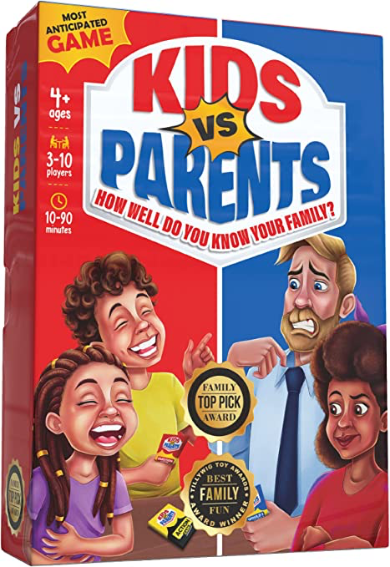
How Chores Can Strengthen Family Bonds
Incorporating chores into your children’s routines is not just about maintaining a clean and orderly home—it’s about fostering a sense of responsibility, independence, and teamwork within your family. Each age-appropriate chore teaches valuable life skills that will serve your children well into adulthood. From the simple tasks of a toddler to the more complex responsibilities of a teenager, every chore contributes to their growth and development.
Chores can also be a wonderful way to strengthen family bonds. Working together on household tasks promotes cooperation and communication. It provides opportunities for parents to teach and guide their children, creating lasting memories and a sense of accomplishment. Moreover, sharing these responsibilities helps children feel more connected to the family unit and understand the importance of contributing to a common goal.


As you implement these chores, remember to be patient and encouraging. Celebrate their successes and offer gentle guidance when needed. The goal is not just to get the house clean but to build confident, capable, and caring individuals who are prepared for the future.
For further reading on building strong family foundations and fostering positive relationships, you might enjoy our article on Building a Strong Foundation for Your Successful Marriage. It offers valuable insights into creating a supportive and loving family environment, which is the perfect backdrop for teaching children the importance of chores and responsibility.
As an Amazon Associate we earn from qualifying purchases through some links in our articles.



